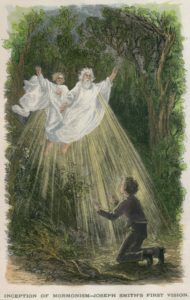I’m going counterculture. I’m going to tell you what I like about Joseph Smith.
I had a particularly rough few years growing up. For example there was this time when my mother came close to dying. One night, I overheard my aunt say to a friend, “Vera still might not make it.” I was eight years old.
At that moment a voice in my head said, “everything will be ok.” From that moment on I didn’t worry about it anymore. My mother was ok, she survived a medical crisis.
As I grew up and became more and more involved in Mormonism and read things Joseph Smith had written, I became particularly comfortable with his style of communicating with God. This was especially the case in the Doctrine and Covenants (D&C).
The D&C are inspirations or revelations Joseph received when he was organizing the church. They usually came when he was confronted by a problem or was under considerable stress.
He made frequent use of phrases like “fear not” (D&C 6: 36), “be patient” (D&D 63:66). This would be followed by a message of guidance which resulted in the gradual organization of the Church of Jesus Christ of Latter Day Saints.
The language was so natural and easy to read, that whenever I thought of Joseph Smith or the D&C those were the first impressions that came to my mind. For me, those revelations were the real deal. (In fact, historians and researches do not challenge the authenticity of the documents of the D&C.)
So, when I was thirty seven, there came a time when I was under a lot of stress, and out of nowhere a voice came to me outside of my head saying, “. . . Be patient my son. I have not forgotten thee (you).”
The voice continued on and gave me a general outline of how things would work out. Afterwards, I followed the message like I would a script. Good things happened. It was like following a trail leading out of one place and ending up in a better place. It was like things were going on around me, but I would just carry on following the road. It was like the opening scene of Field of Dreams (1989) when Kevin Costner is in a corn field and hears a voice coming out of nowhere saying, “Build it and they shall come.” In fact, that’s exactly how it happened to me, except I was in my front yard mowing my lawn.
This started happening in early 1983 and continued on. In late 1990 I started recording these inspirations in six thousand pages of diary entries. I did this for at least fifteen years.
It didn’t take much to realize that Joseph’s pattern of receiving inspiration reinforced a means of receiving support from the unseen world that I had first experienced when I was eight and again when I was thirty seven.
As time passed I used this method so frequently that phrases would come into my mind before I even uttered a prayer. So, at times it seemed as though I started talking to myself. I stepped back from doing this because I concluded that any good thing used to excess can become counterproductive or even pathological.
That’s when I went into my ultra-rational period of life. Every once in a while I’ll call on the voice to calm me down, but absent that, logic and reason are my mental tools.
With that I can both be reasonable about and thankful for Joseph. Joseph reinforced a manner of tapping into my spiritual side that has brought calm to me when stress seemed to be taking me over. It also created scripts in my mind that I followed that have resulted in personal success. I’m thankful for being in an environment that preserves and nurtures Joseph’s manner of receiving inspiration. But, I’m also reasonable about Joseph. He was one very wild dude. He created more controversy than any other single American who has ever lived. He out does Mohammad Ali, Joe Namath, Richard Nixon, etc. by a long, long shot. Those guys are slowly fading into history. Joseph Smith is not.
I listen carefully to others of my faith to see if their spiritual experiences resemble mine to any degree. So far, I am not satisfied that they do. Their experiences usually are arrived at by other means, such as praying about the truthfulness of the Book of Mormon, etc.
I tentatively conclude from this that my mystical experiences are a personal phenomenon and should not be used as a guide book to spirituality. What works for one probably only works for one.
I like Joseph for what he has done for me personally.
At times, he’s very hard to defend, but very easy to like.
